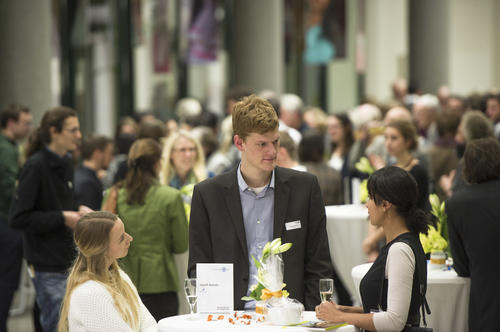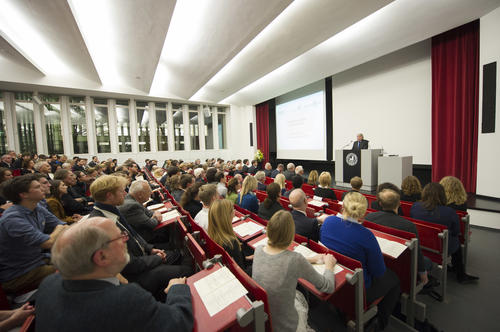“Future from the Very Beginning” – the motto of Freie Universität can still be taken literally, even as the university celebrates its 66th anniversary.
Jul 11, 2016
Scholarship Awarding 2014
Image Credit: Hans-Christian Plambeck
Hörsaal
Image Credit: Hans-Christian Plambeck
In his welcome address, university president Peter-André Alt acknowledged the very special date: It was 66 years ago that Freie Universität Berlin was officially founded at the Titania Palast in Berlin’s Steglitz district. Stanislaw Karol Kubicki, a medical student, was there at the time and went down in the university’s history in 1948 with the student ID number 1. Alt called his visit to the celebration marking the university’s founding this year “a personal joy.” Medical professor Peter Gaehtgens, President of Freie Universität from 1999 until 2003, was also among the guests. The current president welcomed him by name. Gaehtgens is the President of the Berlin Rotary Club, which operates its own foundation. This year, for the first time, the foundation is endowing three Deutschlandipendium scholarships with an international focus. In his role as deputy chairman of Ernst-Reuter-Gesellschaft der Freunde, Förderer und Ehemaligen der Freien Universität Berlin (ERG), Peter Lange highlighted the success story of the central association for the promotion of research and scholarship at Freie Universität Berlin: ERG currently has 5,800 members.
Education as a path to qualifications
Alt said that at Freie Universität, the future means one thing above all: supporting and cultivating the next generation. Pointing out that scholarly and scientific work always involves an element of trial and error, he issued a special call to the recipients of the Deutschlandstipendium who were in attendance to try out new things in their research and scholarship. He said that innovative research was based in part on the courage to forge new paths: “Draw inspiration from your uncertainty. We will make sure that your uncertainty does not also lead to lack of security,” he said.
Providing important impetus for one’s own discipline and beyond through scholarly and scientific work – that is one of the criteria according to which four outstanding dissertations are selected to receive the Ernst Reuter Prize each year. This prize, which carries a monetary award of 5,000 euros, has been granted annually by the Ernst-Reuter-Gesellschaft since 1985. Gunter Gebauer, a professor of philosophy and the head of the panel of judges for the award, said in a speech honoring this year’s winners, “You make a great and positive contribution to improving the image of dissertations in general.”
International recognition for award winners
One of the winners of the Ernst Reuter Prize for 2014 was Karim Adiprasito, of the Department of Mathematics and Computer Science, who won distinction for his dissertation on the issue of what geometry can tell us about objects that are actually not geometric. Jens Elze, a doctoral candidate in literary studies, explored the episodic narrative form of the picaresque novel. Tobias Koch, of the Department of Education and Psychology, studied methods of measuring psychological characteristics such as well-being and stress over time. David Schweinfurth, of the Department of Biology, Chemistry and Pharmacy, wrote his dissertation on chemical materials that could help conserve energy and produce less toxic waste in the future. The four works that received the award have already received international acclaim, bringing offers for postdoctoral positions in the United States, France, England, Israel, and Germany.
Award for outstanding supervision
Outstanding dissertations are impossible without excellent supervision. With this in mind, the DRS Award for Excellent Supervision was created four years ago to honor the valuable work done by doctoral advisors. The distinction is awarded by the Dahlem Research School (DRS), the body responsible for the structured doctoral programs at Freie Universität. It is based on an anonymous survey of doctoral candidates within the 27 programs offered at the DRS. This year’s awards for exemplary supervision of doctoral candidates went to Natalia Kliewer, a professor of business informatics from the German Research Foundation (DFG) research training group Pfadkolleg Research Center, and mathematics professor Rupert Klein, of the Berlin Mathematical School.
At the end of the ceremony, the new recipients of the Deutschlandstipendium and the funders were introduced. During the 2014/2015 academic year, there are 69 students at Freie Universität receiving joint support from the German federal government and private sponsors under the program, including 28 scholarship recipients whose funding has been extended from the previous year thanks to the long-term commitment of many supporters.
Annika Middeldorf


